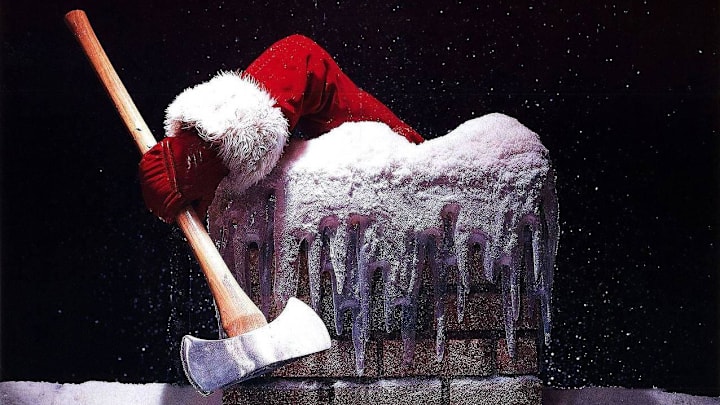Director Charles E. Sellier Jr. would distance himself from his creation, Silent Night, Deadly Night, and there are some basic reasons why. Any film about a killer Santa Claus wouldn't sit right with everyone. Even today, it's guaranteed that some parents find recent "bad Santa" flicks (such as Violent Night) offensive, and why not? What would the kids think to see a hostile-looking Santa Claus, ready to kick ass, or maybe even kill?
In this freakish holiday story, we are introduced to a killer Santa (Charles Dierkop) who viciously attacks a perfectly innocent family, the Chapmans, returning home after visiting an old coot grandpa (Will Hare). At the old folk's home, Gramps warned young Billy Chapman (Jonathan Best) that Santa has a mean streak against naughty children, and is prepared to go rogue against anyone on the naughty list. What a prophet! The murderer Santa shoots Mr. Chapman (Geoff Hansen), then attempts to rape Mrs. Chapman (Tara Buckman) before murdering her. It's truly one of the most controversial Christmas-time horror films for these moments alone.
'Silent Night, Deadly Night' and the power of disruption
Silent Night, Deadly Night strongly suggests that no one walks away from tragedies unscathed, either on the next day or even years later. There is also no new father figure for the grown-up Billy (Robert Brian Wilson), either. As adult life and the holiday season approach him, Billy is quite unsure of himself and has longstanding mixed messages about sexuality and morality overall. A stern nun (Lilyan Chauvin) only adds to his anger and confusion, and the audience's unease. In the minds of many, Silent Night, Deadly Night earned its "R" rating, at the very least.
The film tells the story of a young man named Billy Chapman, who witnesses his parents' murder by a man dressed as Santa Claus on Christmas Eve. Traumatized by the incident, Billy grows up in an orphanage with strict nuns. As an adult, Billy gets a job at a toy store and is forced to dress up as Santa Claus during the Christmas season. The traumatic memories resurface, leading Billy to embark on a killing spree, punishing those he deems "naughty" according to his skewed sense of morality, which deems all sexuality and misbehavior as worth the death penalty (and frankly, there are plenty of authoritarians out there who seem to be a lot like Billy Chapman.
A movie not for anyone to see?
The film features elements of exploitation and graphic violence, which stirred controversy upon its release. The movie not only gained notoriety for its controversial subject matter and marketing campaign. It was particularly controversial, as it featured images of a sinister-looking Santa Claus carrying an axe. Film critic Gene Siskel did his own marketing for the flick, perhaps inadvertently, by whining: “You people have nothing to be proud of...Your profits truly are blood money.”
Siskel's probably more famous pal, Roger Ebert, added that he’d “like to hear them [the filmmakers] explain to their children and their grandchildren that it’s only a movie.”
The marketing campaign for Silent Night, Deadly Night outraged parents and various groups, leading to protests and calls for the film's removal from theaters. As a result, the movie was pulled from many theaters shortly after its release. It's ironic that, in a way, the messaging that "you're naughty boys and girls if you enjoy this movie" almost mirrors the puritanical nuns who helped push Billy over the edge with the message that engaging in any "immoral behavior" deserves punishment. They also overlook how, to a large degree, Billy isn't treated exactly as some hero (similarly, Joker is bashed for having an alleged “incel” anti-hero lead character, who they say is treated as a protagonist — though I see him as a tragic character).
Despite the controversy, Silent Night, Deadly Night has gained a cult following over the years, and it spawned several sequels. The film is often regarded as a notable entry in the slasher subgenre of horror films, especially for its unique take on the Christmas season. If you're a fan of 1980s horror movies and are interested in films with a holiday theme. Silent Night, Deadly Night might be worth checking out, keeping in mind its controversial nature and graphic content.
The broader appeal of holiday slashers
Chris Vander Kaay and Kathleen Fernandez-Vander Kaay, authors of Horror Films by Subgenre: A Viewer's Guide, explain the appeal of such holiday horror (pages 98–9):
"The expression 'adding insult to injury' is an excellent encapsulation of the motivation behind the horror movie obsession with holidays (aside from the obvious desire to brand a killer with a theme and costume that can be revisited many times within a lucrative film franchise). The holiday is a place for happiness and family... The horror movie loves nothing more than irony (except perhaps a good death scene), and there is very little more ironic than the fear and isolation of a horror movie taking place right in the middle of the festivities."
One of the great, tantalizing ironies of this film is that, one of its original critics, film star Mickey Rooney, actually went on to star as the main villain in the 5th installment of the franchise, Silent Night, Deadly Night 5: The Toy Maker. Did he pull a Betsy Palmer and only do it for the money or did he maybe want to boost his reputation in the horror genre? Either way, it's an unusual gift, and a better movie than one might think. One last thing: Punish!
